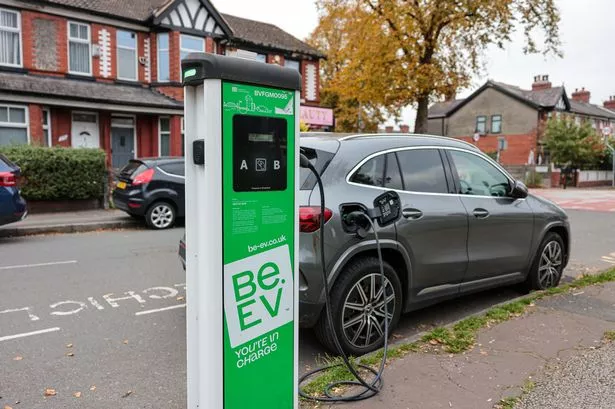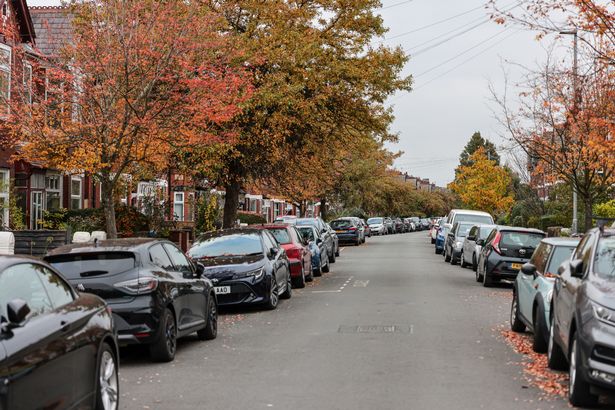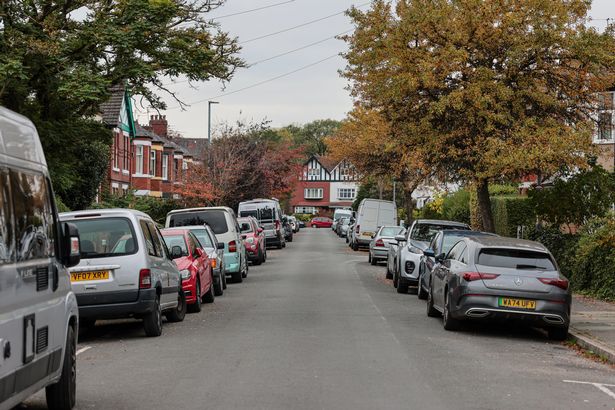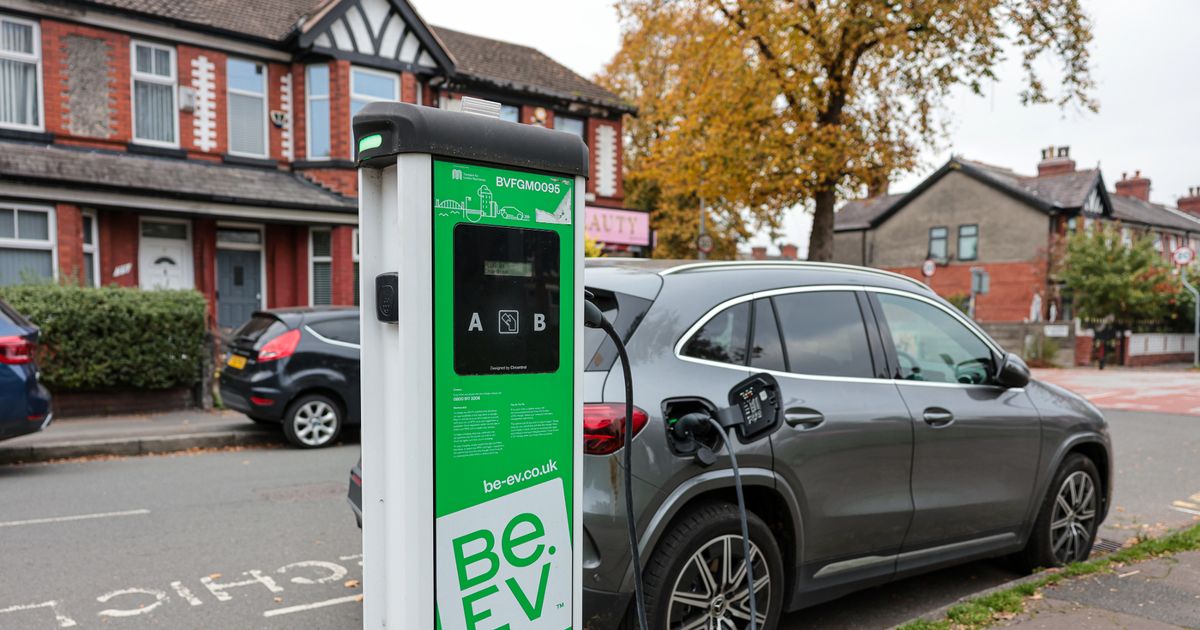“Are we going to talk about people being unable to drive their cars because they cannot charge them?” The public charger on Oswald Road used to be free but now costs – it’s one way those with an electric car but no driveway can charge at near home. But is Manchester ready for 170,000 cars to switch?(Image: Kenny Brown | Manchester Evening News)
The public charger on Oswald Road used to be free but now costs – it’s one way those with an electric car but no driveway can charge at near home. But is Manchester ready for 170,000 cars to switch?(Image: Kenny Brown | Manchester Evening News)
There are 170,000 cars in Manchester for 551,000 people. And one day soon, the vast majority will be electric.
Last year, a fifth of all new cars sold were all-electric. On average, electric models are still more expensive than petrol or diesel cars — but some EVs are now cheaper than fossil fuel counterparts.
The electric revolution promises quieter streets and cleaner air. But it also presents problems.
Join the Manchester Evening News WhatsApp group HERE
EVs are usually much heavier than traditional combustion engine cars, making them more dangerous if they hit a pedestrian or cyclist.
They’re so heavy they can break kerbstones down faster, due to the weight of the batteries pressing down for extended periods of time when parked.
But the big issue Manchester town hall is now grappling with is how residents will be able to charge thousands of battery-powered cars.
While some have driveways where they can install a home-charger, ‘very few’ Mancunian homes have off-street parking.
In London, this is sometimes solved by installing chargers inside lamp-posts. But that’s not considered viable in Manchester as only 3pc of the city’s lamp-posts sit on the ‘kerb’ side of the road to house EV chargers.
 Nicolas Road is leafy and near a primary school, shops, and a park(Image: Kenny Brown | Manchester Evening News)
Nicolas Road is leafy and near a primary school, shops, and a park(Image: Kenny Brown | Manchester Evening News)
It means owners need to charge their car at a public charger nearby, or drape a cable across the pavement.
That’s a problem on Nicolas Road in Chorlton, according to local councillor Tina Kirwin-McGinley.
“People are hanging leads over trees,” she told a council environment scrutiny meeting last week (October 7). “The lead is not on the pavement so it’s not a trip hazard but I am sure it cannot be very safe.”
Leafy and lined with classic redbrick terraces and semis, Nicolas Road’s proximity to well-rated Oswald Road Primary School and parks means it’s easy to see why well-off Mancs want to raise a family here.
Semis regularly sell for more than half-a-million pounds, and plenty of its inhabitants work in professional fields.
Many EV owners here joined the electric revolution with a company car. Mum Lauren Beebe is one.
 Mum and national sales manager Lauren Beebe has a hybrid company car – but wouldn’t go fully electric at the moment(Image: Kenny Brown | Manchester Evening News)
Mum and national sales manager Lauren Beebe has a hybrid company car – but wouldn’t go fully electric at the moment(Image: Kenny Brown | Manchester Evening News)
She seems to like her hybrid Mercedes, but hasn’t forked out the £800 for a home charger, because she hasn’t got a driveway.
“Until I know how much charge I need versus how much it is for petrol, I will not shell out for an £800 charger at home,” explained Lauren, a national sales manager for a paint company.
“I cover the whole UK, so if I go fully electric to get a free charger [at home], I would still mean I am out on the road charging.”
She’s worried being fully-electric will mean taking meetings from service stations while she re-charges, which she says take too long at the moment. And when you have to regularly drive to-and-from Dorset for work, like Lauren does, that’s ‘a barrier to going fully electric’.
Sarah Phillips, a 39-year-old actuary, has had an electric car for years. Before she moved to her home with a driveway and home charger, she had to drag a cable over the pavement for her hybrid.
“It wasn’t ideal, but you could get a cover over it,” she explained. Another option was going to the then-free-to-use public charger on Oswald Road, a two-minute walk away.
“That was great,” she added, but admitted since it now costs to charge, her family wouldn’t have gone electric unless they could charge on a driveway at home.
 Some have joined the electric revolution here, but not all(Image: Kenny Brown | Manchester Evening News)
Some have joined the electric revolution here, but not all(Image: Kenny Brown | Manchester Evening News)
She’s happy they waited: “It’s great. I’ve had no issues. It works really well.”
Husband-and-wife Steve and Jenny Lee have an all-electric Hyundai through his work in the chemical industry. He has to work in the office five days a week, giving him an ideal opportunity to charge the car.
That explains why the duo didn’t fork out the £1,000-plus were quoted for a home charger.
But despite the relative plain sailing, Jenny said she wouldn’t make the switch.
“If I was buying a new car now, I would not buy electric,” she explained. “We went to London [last weekend] and got to a services and all the chargers were full.
“Charging availability has got better, but the ones at the services are expensive.
“Factoring in more time [for journeys] means you have to take a break. That’s a positive, but not if you’re commuting.”
Lauren, Sarah, Jenny, and Steve are at the forefront of the electric revolution, solving charging problems as they come up. But councillors are ‘really concerned’ about how authorities will solve those issues on a city-wide scale.
“I do think we need a proper systemic way of meeting all of these safety things,” said Coun Mandie Shilton-Godwin.
“The question of enabling people to walk on the pavement is so important. [We have] 170,000 cars and very few people have their own off-street parking.
“Finding off street charging is really challenging. Are we going to talk about people being unable to drive their cars because they cannot charge them?”
